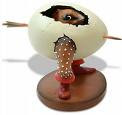Continental Political Theory
Anti-Oedipus: Capitalism and Schizophrenia summary paper
Terese Howard
10/24/09
Gilles Deleuze and Felix Guattari begin their book, Anti-Oedipus: Capitalism and Schizophrenia, with these words:
“It is at work everywhere, functioning smoothly at times, at other times it fits and starts. It breaths, it heats, it eats. It shits and fucks. What a mistake to have ever said the id. Everywhere it is machines – real ones, not figurative ones: machines driving other machines, machines being driven by other machines, with all the necessary couplings and connections” (Deleuze and Guattari, Anti-Oedipus, 1).
Is this book merely a game of cat and mouse (“hey look what I can say! You can’t catch me…”)
or are they really getting at something important? The first time you read the book it may be just a game of chase (I think it mostly was for me), but I speculate that if read a second or third time the chase may become overtaken by revelations. In my brief paper on this book I will not even attempt to summarize, but instead will attempt to rearticulate what is being said about two important themes throughout the book – desiring machines and the capitalist machine.
As seen in the quote above, Deleuze and Guattari see machines everywhere. The body, the earth, desire, everything processes as a machine. In the same light they declare that “everything is production” (4). Nothing is ever done producing. Food, a computer, a spoon, everything is production as it continues to produce and is tied up to other machines that continue to produce. Nonetheless, just because nothing is ever done producing does not mean that nothing is ever produced. It is important to note that “Something is produced: the effects of a machine, not merely metaphors” (2). Products exist but only as producers. Furthermore, “production is immediately consumption and a recording process” (4). The distinction between production and consumption – and the process which records those – is collapsed by the prevalence of production in both consumption and recording.
Desire as a machine is referred to as the desiring-machine. Desire has been treated almost exclusively as a lack. Deleuze and Guattari instead see desire as a positive, productive force. Instead of treating desire as coming from the intrinsic lack of a phallus which seeks unification in the daddy-mommy-me triad, they see desire as originating outside the desiring machine not in lack but in flows of production. Desiring machines involve heterogeneous parts in connective synthesis, not independent parts in functioning whole. In this way, “A schizophrenic out for a walk is a better model than a neurotic lying on the analyst’s couch” (2). The schizophrenic is not being unified by some lack but is stimulated by desires outside himself or even his “triadic unification” (daddy-mommy-me). Desiring machines are social, always coupling with other machines, connecting to flows from one or the other, flowing between them. Desiring machines are not self contained or originating.
The capitalist machine is distinct from the desiring machine, and other machines, in a few ways. While the desiring machine has heterogeneous parts the capitalist machine originates from within itself. Even though the capitalist machine originates in itself it is not contained within itself. It is continually connected to other machines, but always begins as the capitalist machine. The capitalist machine is also distinct in that “it is the only social machine that is constructed on the basis of decoded flows, substituting for intrinsic codes an axiomatic of abstract quantities in the form of money” (139). Whereas the socius (social sphere) codes desire, capitalism’s flows are not coded at all. Capital itself is the body without organs (10). Capital “produces surplus value, just as the body without organs reproduces itself” (10). Surplus value here is an abstract flow that has no connection to the territorial flows of primitive society. Because of its abstract nature, capital has no territory. Privatization in capitalism also decodes the flows of capital. Privatization makes that flows only a property not the coded flow. Deleuze and Guattari declare, “At capitalism’s limit the deterrritorialized socius gives way to the body without organs, and the decoded flows throw themselves into desiring-production” (140). At its limits capitalism is a flow of money which makes more money and never does anything but that.
I shall conclude these summaries of desiring machines and capitalist machines with one more quote.
“An apparent conflict arises between the desiring-machines and the body without organs. Every coupling of machines, every production of a machine, every sound of a machine running, becomes unbearable to the body without organs. Beneath its organs it sense there are larvae and loathsome worms, and a God at work messing it all up or strangling it by organizing it” (9).
Deleuze, Gilles and Guattari, Felix Anti-Oedipus: Capitalism and Schizophrenia Penguin Books: New York, 1972.
Subscribe to:
Post Comments (Atom)

1 comment:
Dearest Terese, I hope you are home safe in your palace after pony.
I love that concluding quote. It seems like the crux of it to me, or maybe it's just something I can understand. But what a bizarre book. Mashing together the body, machines, capitalism, psychoanalysis... I wouldn't even know how to read that. I now want to try, though.
Post a Comment